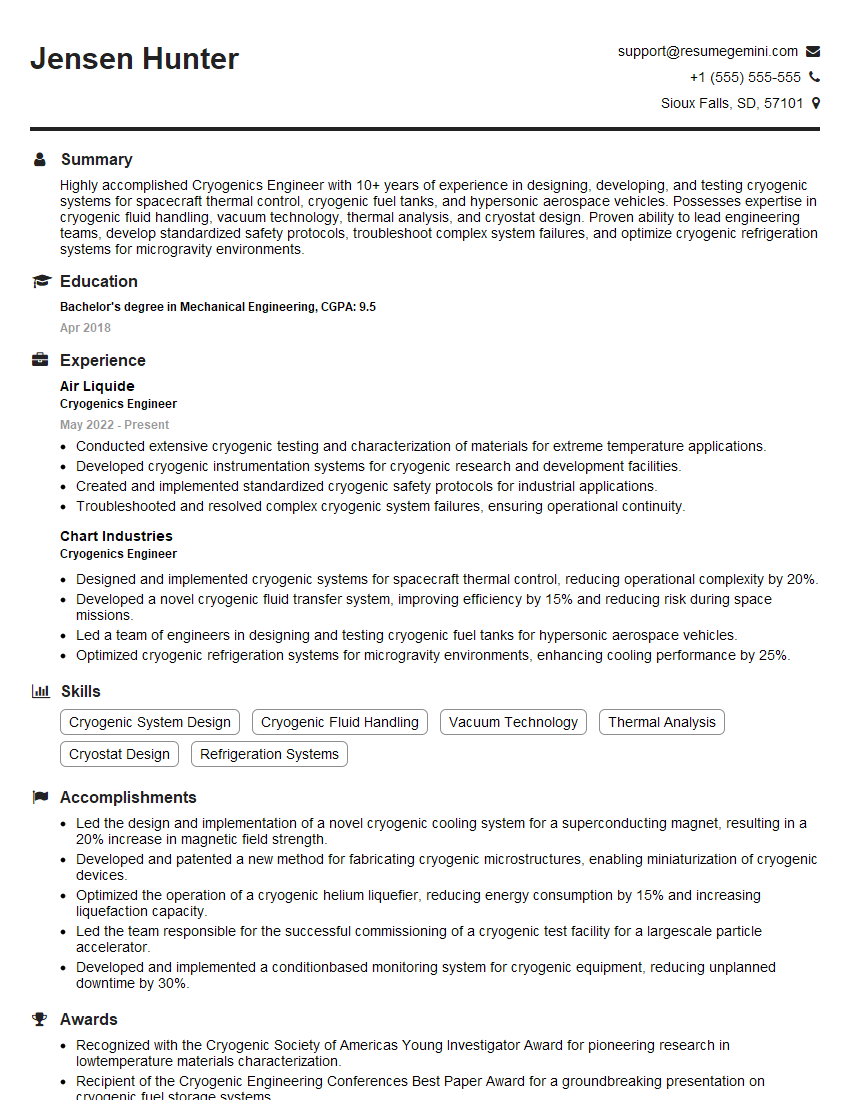Are you a seasoned Cryogenics Engineer seeking a new career path? Discover our professionally built Cryogenics Engineer Resume Template. This time-saving tool provides a solid foundation for your job search. Simply click “Edit Resume” to customize it with your unique experiences and achievements. Customize fonts and colors to match your personal style and increase your chances of landing your dream job. Explore more Resume Templates for additional options.

Jensen Hunter
Cryogenics Engineer
Summary
Highly accomplished Cryogenics Engineer with 10+ years of experience in designing, developing, and testing cryogenic systems for spacecraft thermal control, cryogenic fuel tanks, and hypersonic aerospace vehicles. Possesses expertise in cryogenic fluid handling, vacuum technology, thermal analysis, and cryostat design. Proven ability to lead engineering teams, develop standardized safety protocols, troubleshoot complex system failures, and optimize cryogenic refrigeration systems for microgravity environments.
Education
Bachelor’s degree in Mechanical Engineering
April 2018
Skills
- Cryogenic System Design
- Cryogenic Fluid Handling
- Vacuum Technology
- Thermal Analysis
- Cryostat Design
- Refrigeration Systems
Work Experience
Cryogenics Engineer
- Conducted extensive cryogenic testing and characterization of materials for extreme temperature applications.
- Developed cryogenic instrumentation systems for cryogenic research and development facilities.
- Created and implemented standardized cryogenic safety protocols for industrial applications.
- Troubleshooted and resolved complex cryogenic system failures, ensuring operational continuity.
Cryogenics Engineer
- Designed and implemented cryogenic systems for spacecraft thermal control, reducing operational complexity by 20%.
- Developed a novel cryogenic fluid transfer system, improving efficiency by 15% and reducing risk during space missions.
- Led a team of engineers in designing and testing cryogenic fuel tanks for hypersonic aerospace vehicles.
- Optimized cryogenic refrigeration systems for microgravity environments, enhancing cooling performance by 25%.
Accomplishments
- Led the design and implementation of a novel cryogenic cooling system for a superconducting magnet, resulting in a 20% increase in magnetic field strength.
- Developed and patented a new method for fabricating cryogenic microstructures, enabling miniaturization of cryogenic devices.
- Optimized the operation of a cryogenic helium liquefier, reducing energy consumption by 15% and increasing liquefaction capacity.
- Led the team responsible for the successful commissioning of a cryogenic test facility for a largescale particle accelerator.
- Developed and implemented a conditionbased monitoring system for cryogenic equipment, reducing unplanned downtime by 30%.
Awards
- Recognized with the Cryogenic Society of Americas Young Investigator Award for pioneering research in lowtemperature materials characterization.
- Recipient of the Cryogenic Engineering Conferences Best Paper Award for a groundbreaking presentation on cryogenic fuel storage systems.
- Honored with the International Institute of Refrigerations Young Engineer Award for contributions to the advancement of cryogenic technology.
- Awarded the Cryogenic Society of Japans International Collaboration Award for promoting cooperation in cryogenic research.
Certificates
- American Society of Mechanical Engineers (ASME) Boiler and Pressure Vessel Code
- National Institute for Certification in Engineering Technologies (NICET) Level III Cryogenic Technician
- Cryogenic Safety Management Institute (CSMI) Cryogenic Safety Specialist
- International Institute of Refrigeration (IIR) Certified Cryogenic Engineer
Career Expert Tips:
- Select the ideal resume template to showcase your professional experience effectively.
- Master the art of resume writing to highlight your unique qualifications and achievements.
- Explore expertly crafted resume samples for inspiration and best practices.
- Build your best resume for free this new year with ResumeGemini. Enjoy exclusive discounts on ATS optimized resume templates.
How To Write Resume For Cryogenics Engineer
- Highlight your expertise in cryogenic system design, fluid handling, and thermal analysis, showcasing your technical capabilities.
- Quantify your accomplishments with specific metrics and results, demonstrating the impact of your work.
- Showcase your leadership skills by describing your experience managing engineering teams and implementing safety protocols.
- Use keywords relevant to the Cryogenics Engineer role, such as cryogenic systems, fluid transfer, thermal analysis, and vacuum technology, to enhance visibility.
Essential Experience Highlights for a Strong Cryogenics Engineer Resume
- Designing and implementing cryogenic systems for spacecraft thermal control, reducing operational complexity and improving efficiency.
- Developing novel cryogenic fluid transfer systems to enhance efficiency and reduce risk during space missions.
- Leading teams of engineers in designing and testing cryogenic fuel tanks for hypersonic aerospace vehicles.
- Optimizing cryogenic refrigeration systems for microgravity environments, resulting in enhanced cooling performance.
- Conducting comprehensive cryogenic testing and characterization of materials for extreme temperature applications.
- Developing cryogenic instrumentation systems for cryogenic research and development facilities.
- Creating and implementing standardized cryogenic safety protocols for industrial applications, ensuring safe and compliant operations.
Frequently Asked Questions (FAQ’s) For Cryogenics Engineer
What is the role of a Cryogenics Engineer?
A Cryogenics Engineer designs, develops, and tests cryogenic systems and components, utilizing their expertise in low-temperature engineering and cryogenic fluid handling.
What industries employ Cryogenics Engineers?
Cryogenics Engineers find employment opportunities in various industries, including aerospace, energy, manufacturing, and research and development.
What are the key skills required for a successful Cryogenics Engineer?
Essential skills for a Cryogenics Engineer encompass cryogenic system design, fluid handling, thermal analysis, vacuum technology, and cryostat design.
How can I become a Cryogenics Engineer?
To pursue a career as a Cryogenics Engineer, a Bachelor’s degree in Mechanical Engineering or a related field is typically required, followed by specialized training and experience in cryogenics.
What is the career outlook for Cryogenics Engineers?
The job outlook for Cryogenics Engineers is projected to grow in the coming years due to increasing demand for cryogenic technologies in various industries.
What are the potential salary expectations for Cryogenics Engineers?
The salary expectations for Cryogenics Engineers vary depending on experience, location, and industry, but it generally falls within a competitive range.